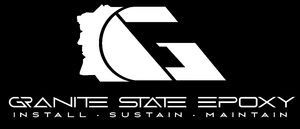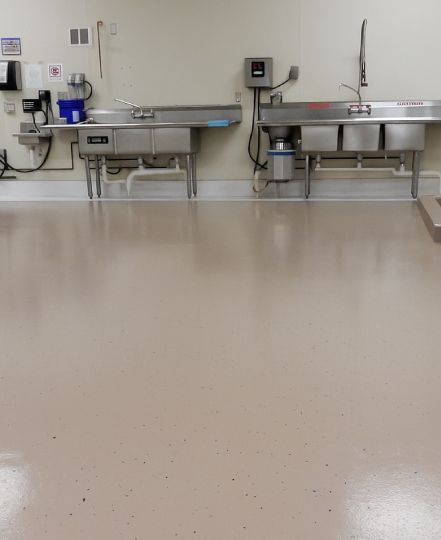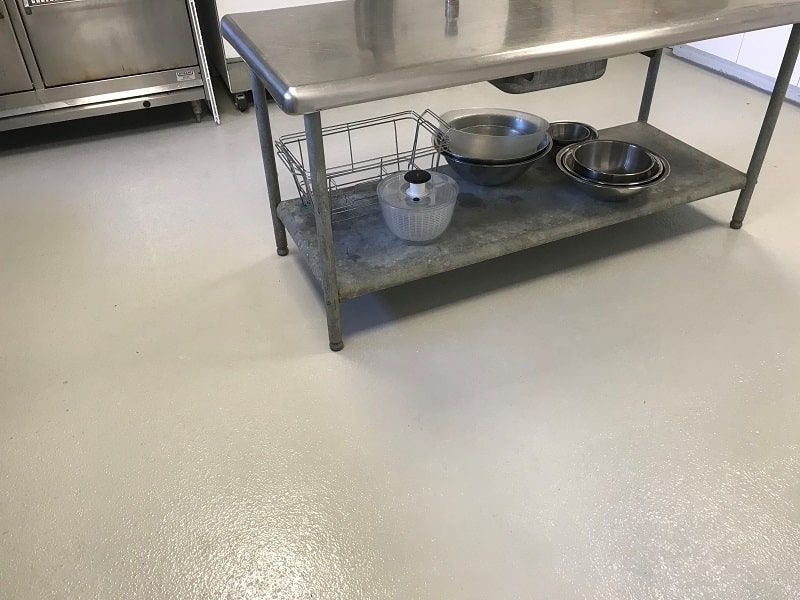Why More Restaurants in NH Are Choosing Slip-Resistant Epoxy Floors: A Safety-Driven Kitchen Solution
Restaurant safety relies on a solid foundation and slip-resistant epoxy flooring is essential for the food service industry in New Hampshire. We've seen a significant increase in restaurant owners choosing this durable coating to protect both their staff and customers from workplace accidents.
Epoxy floors create a seamless, non-porous surface that resists water, grease and heavy foot traffic while providing superior slip resistance through specialized aggregate additives. This mix of safety and durability makes it a smart choice for busy kitchens, where spills and moisture happen every day.
These specialized floor coatings represent a practical investment that pays off through reduced maintenance costs, improved safety records and enhanced operational efficiency. We've found that restaurants with epoxy flooring spend less time on cleaning and more time focusing on what matters most - serving their customers.
Why New Hampshire Restaurants Are Choosing Slip-Resistant Epoxy Floors
Restaurant owners across New Hampshire prioritize safety, durability, and cleanliness in their flooring choices. Slip-resistant epoxy floors deliver exceptional performance in these critical areas while providing excellent value.
Health and Safety Compliance
Commercial kitchens face strict health and safety standards, and epoxy floor coatings help meet them. Their non-porous surface blocks bacterial growth and makes cleaning and sanitizing much simpler.
The slip-resistant properties of epoxy flooring help prevent workplace accidents, especially in areas prone to spills and moisture. This protection extends to both kitchen staff and servers moving quickly during busy service times.
We've seen that properly installed epoxy floors can maintain their slip-resistant qualities even when exposed to grease, water and cleaning chemicals commonly found in restaurant environments.
Benefits of Slip-Resistant Flooring
Slip-resistant epoxy coating offers key advantages for restaurants:
- Temperature resistance from -50°F to 140°F
- Chemical resistance to acids, oils, and cleaning agents
- Seamless surface with no grout lines to harbor bacteria
- Easy cleaning with standard restaurant equipment
Because epoxy floors are non-porous, they don’t absorb water—helping to prevent mold growth beneath the surface.
Durability in High-Traffic Areas
Restaurant floors face constant challenges from heavy equipment, foot traffic, and impact stress. Epoxy flooring withstands these demands without cracking or chipping.
Commercial kitchen floors coated with epoxy typically last 10-15 years with proper maintenance. This longevity makes them cost-effective compared to traditional flooring options.
Heavy equipment like refrigerators and stoves can be moved without damaging the floor surface. The coating stays strong and intact, even with heavy food carts rolling over it and continuous foot traffic day after day.
Key Features and Installation of Epoxy Flooring Solutions
Epoxy flooring systems combine durability with customizable safety features through specialized application techniques and carefully selected materials. Restaurant owners can choose from multiple texture levels and coating types to match their specific needs.
How Non-Slip Epoxy Coatings Work
The non-slip properties of epoxy floors come from a multi-layer application process. A base coat bonds with the concrete substrate to create a solid foundation.
The middle layer contains specially engineered compounds that create microscopic peaks and valleys across the surface, providing traction even when wet.
A clear topcoat seals everything while maintaining the grip pattern. This system creates friction without forming deep grooves that could trap debris or bacteria.
Anti-Slip Additives and Material Options
Common Anti-Slip Additives:
- Aluminum oxide particles
- Quartz sand
- Glass beads
- Polymer grit
Each additive offers different texture levels, from subtle to aggressive. We can customize the amount of grit to match specific areas - heavier near dish stations, lighter in dining areas.
The base epoxy resin comes in various formulations:
- Standard epoxy (2-part system)
- Novolac epoxy for extreme chemical resistance
- Fast-cure systems for quick installation
Installation and Maintenance Best Practices
Professional installation requires careful surface preparation, including:
- Diamond grinding or shot blasting
- Crack repair
- Moisture testing
Temperature and humidity must be controlled during application. Each layer needs proper cure time before the next application.
For routine cleaning, use regular detergents and hot water. To keep the non-slip surface of the floor in good condition, do a deep clean with commercial degreasers once a week.
Comparing Epoxy to Other Flooring Solutions
Durability Comparison:
| Flooring Type | Lifespan | Chemical Resistance | Slip Resistance |
|---|---|---|---|
| Epoxy | 10-20 years | Excellent | High |
| Urethane | 7-15 years | Very Good | Moderate |
| Polished Concrete | 5-10 years | Fair | Variable |
Epoxy offers better moisture resistance than polished concrete and superior impact resistance compared to urethane coatings.
Traditional tile requires frequent grout maintenance and can't match epoxy's seamless surface for sanitation.
Frequently Asked Questions
Restaurant owners need specific details about slip-resistant epoxy flooring to make informed decisions about this safety-focused investment. We've gathered expert answers to common questions about durability, compliance and practical considerations.
What are the advantages of installing slip-resistant epoxy floors in a commercial kitchen?
Slip-resistant epoxy floors create a safe working environment by providing reliable traction even when wet or greasy.
These floors withstand daily spills from food, drinks, and cleaning solutions without staining or deteriorating.
The seamless surface eliminates grout lines where bacteria could grow, making sanitization more effective and thorough.
How does slip-resistant epoxy flooring contribute to a restaurant's compliance with health and safety codes in NH?
The non-porous surface meets New Hampshire health department requirements for cleanable food service surfaces.
Anti-slip additives help restaurants meet workplace safety standards for slip prevention.
The seamless installation prevents moisture accumulation that could lead to mold or bacterial growth.
Can epoxy floors withstand the heavy traffic and harsh conditions of a commercial kitchen?
Epoxy floors are seven times stronger than standard concrete surfaces.
The coating resists impacts from dropped utensils and the movement of heavy equipment like refrigerators and ovens.
Heat from cooking operations and repeated exposure to water won't damage properly installed epoxy surfaces.
What factors should a restaurant consider when choosing the right slip-resistant floor coating?
The level of foot traffic and frequency of spills should determine the thickness of the epoxy coating.
Kitchen layout and equipment placement affect the type of anti-slip additives needed in different areas.
Local temperature variations and humidity levels influence the curing process and final performance.
How does the cost of slip-resistant epoxy flooring compare to traditional restaurant flooring options?
Initial installation costs may be higher than vinyl or tile, but epoxy floors typically last 15-20 years with proper maintenance.
The reduced need for repairs and replacement makes epoxy flooring more cost-effective long-term.
Lower maintenance expenses and decreased slip-and-fall liability contribute to the return on investment.
What are the maintenance requirements for slip-resistant epoxy flooring in high-volume dining establishments?
Daily cleaning requires only standard restaurant floor cleaners and regular mopping.
The non-porous surface prevents stains and makes spill cleanup quick and efficient.
Professional deep cleaning twice yearly helps maintain the slip-resistant properties and extend the floor's lifespan.
Conclusion
Slip-resistant epoxy flooring provides New Hampshire restaurants with a safe, durable and easy-to-maintain solution. Protect your staff, customers and operations with long-lasting, high-performance flooring—contact us today to learn how we can upgrade your kitchen.


